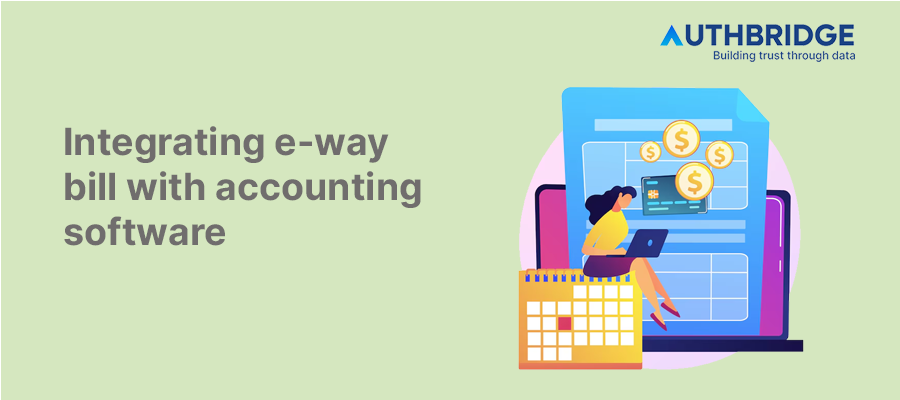Integrating E-Way Bill With Accounting Software: Enhancing Compliance And Operational Efficiency

1. Introduction to E-Way Bill Integration
Importance of E-Way Bill in Business Operations
The Electronic Way (E-Way) Bill is a critical component in the logistics and supply chain management of goods across India, mandated for the movement of goods exceeding a certain value threshold. It serves as a compliance mechanism to ensure goods are transported in accordance with GST laws, facilitating smoother tax audits and reducing tax evasion.
Overview of E-Way Bill Integration with Accounting Software
Integrating E-Way Bill processes with accounting software represents a significant leap towards operational efficiency and regulatory compliance. This integration allows businesses to automate the generation of E-Way Bills directly from their accounting or ERP systems, minimizing manual data entry and errors.
2. Benefits of Integrating E-Way Bill with Accounting Software
Integrating E-Way Bill with accounting software streamlines business operations, ensuring compliance and improving efficiency. Here are the key benefits:
- Streamlining Accounting and Compliance Processes: Integration automates the E-Way Bill generation process, reducing manual efforts and the risk of errors. It ensures that businesses remain compliant with GST regulations without additional workload.
- Enhancing Efficiency and Accuracy: Automated data transfer between the accounting software and the E-Way Bill portal ensures accuracy in reporting. It eliminates discrepancies between financial records and E-Way Bills, making audits smoother.
- Real-Time Tracking and Management of E-Way Bills: Businesses can track the status of E-Way Bills in real-time, directly from their accounting software, enabling better logistics and supply chain management.
Data Table: Benefits of E-Way Bill Integration
Benefit | Description | Impact |
Streamlined Processes | Automates generation and reduces manual data entry | Increased compliance and efficiency |
Enhanced Accuracy | Eliminates discrepancies and errors | Improved financial reporting and audit readiness |
Real-Time Management | Tracks E-Way Bill status directly | Better logistics and supply chain oversight |
3. Key Features to Look for in E-Way Bill Integrated Accounting Software
When selecting accounting software with E-Way Bill integration, consider these essential features:
- Automated E-Way Bill Generation: Software should automatically generate E-Way Bills upon creating invoices, using the invoice data.
- Seamless Data Synchronization: Ensures real-time data flow between the accounting system and the E-Way Bill portal, updating any changes instantly.
- Compliance and Reporting Tools: Features tools for compliance checks, report generation, and audit trails to ensure GST compliance.
- Security and Data Protection: Prioritizes data security, protecting sensitive financial information during transmission and storage.
4. Step-by-Step Guide to Integrating E-Way Bill with Accounting Software
Selecting the Right Accounting Software
Choose software that offers comprehensive integration capabilities with the E-Way Bill portal, considering your business size, industry, and specific needs.
Setting Up Integration
- Configuration: Input GSTIN details and configure the software to align with your billing and logistics processes.
- API Integration: Connect the accounting software with the E-Way Bill system using API credentials provided by the GST portal.
Generating and Managing E-Way Bills
Generate E-Way Bills directly through the accounting software for each eligible transaction, and manage them efficiently within the same platform.
5. Challenges and Solutions in Integration
Integration can come with its set of challenges, from technical issues to compliance misunderstandings. Here's how to address them:
- Common Integration Challenges: Technical glitches, data mismatch, and adapting to new software functionalities.
- Troubleshooting and Solutions: Regular software updates, thorough training for staff, and ongoing support from software providers can mitigate these challenges.
6. Future Trends in E-Way Bill and Accounting Software Integration
The future of E-Way Bill integration looks promising, with advancements in AI and machine learning expected to offer predictive analytics for better compliance and operational decisions. Additionally, regulatory changes will likely continue to shape the integration landscape, making flexibility and adaptability key features of successful accounting software.
Conclusion
Integrating E-Way Bill with accounting software is not just a step towards compliance; it's a leap towards operational excellence. By automating and streamlining critical processes, businesses can focus more on growth and less on administrative tasks. As technology and regulations evolve, staying informed and adaptable will be crucial for continued success in this area.
Category

Abhinandan Banerjee
(Associate Manager - Marketing)
Abhinandan is a dynamic Product and Content Marketer, boasting over seven years of experience in crafting impactful marketing strategies across diverse environments. Known for his strategic insights, he propels digital growth and boosts brand visibility by transforming complex ideas into compelling content that inspires action.



